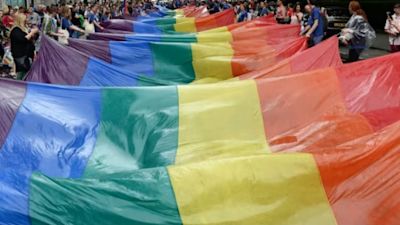Pride at 50: Met Police officers won't march in uniform over 'institutional homophobia' concerns

Ahead of official pride in London tomorrow, veterans of the 1972 march retraced their pioneering steps - Natalia Jorquera reports
The Metropolitan Police has agreed that its officers will not march in uniform at this weekend's 50th London Pride event after concerns were raised by organisers about "institutional homophobia" within the force.
Organisers Pride in London said the presence of uniformed officers taking part in the event voluntarily "undermined" the concerns of the LGBT+ community following high-profile incidences that led to accusations of homophobia in the Met.
It came after Peter Tatchell told The Guardian the Stephen Port serial killer case showed "institutional homophobia is alive and kicking in the Metropolitan Police" and called for Pride organisers to take a stand on the presence of uniforms being worn at the parade.
"While there are many good officers, and they are welcome to march in civilian clothes, Pride needs to challenge the police as an institution, otherwise they will never reform," Mr Tatchell told the paper.
On Friday, the Met said it recognised a number of incidents "have damaged trust and confidence in policing, especially amongst the LGBT+ community" and said that police officers attending this year's event would not do so in work uniform.
However, officers who are working at the event will still be in uniform, the force said.
A Met statement added: "We believe this is an inclusive approach which allows our own LGBT+ staff association colleagues to be visible as community members in their own right while being sensitive to legitimate concerns raised by the wider community about policing itself."
This year is a significant year for the Pride movement and the LGBT+ community, which will commemorate 50 years since the first Pride took place in the United Kingdom.
Pride and the police
On the 1 July 1972, hundreds of members of the Gay Liberation Front marched from Trafalgar Square to Hyde Park, under the watch of a heavy police presence following a spate of homophobic murders and attacks.
“We kissed in defiance and I can remember looking at the police – there were lines of police with their arms folded looking very aggressive and hostile – but they didn’t dare arrest us because there were so many of us,” Tatchell told the Evening Standard in 2016.
By 2003, tens of thousands of attendees were joining the event and rules were relaxed on gay officers taking part in the march in uniform.
At the time, Metropolitan Police Inspector Stephen Warwick marched in uniform with his partner. He told the Guardian the moment was "hugely symbolic".
"The amount of support we've received makes us feel very proud," he told the paper. "The older members never thought they would see this."
In 2022, the U-turn on the presence of uniforms at Pride, just weeks after the police watchdog announced it will investigate the Met's handling of Port's case, demonstrates how the relationship between the police and the LGBT+ community has regressed.
Hundreds of thousands of people are expected to descend on the capital for Saturday's parade, which will pay homage to the 1972 march.
Want a quick and expert briefing on the biggest news stories? Listen to our latest podcasts to find out What You Need To Know...